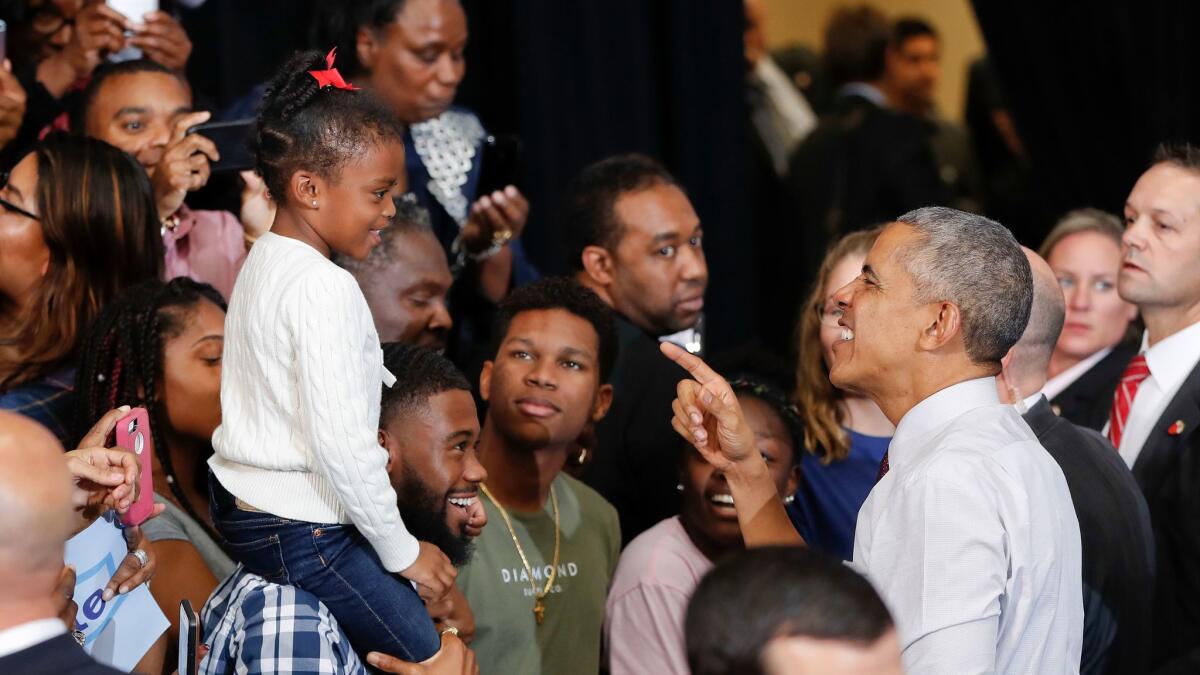Obama tells blacks to vote, because ‘Barack is personally asking them’

- Share via
Reporting from Washington — President Obama extolled the virtues of Hillary Clinton and warned of the dangers of Donald Trump, and then he boiled it down to a personal appeal:
“I need you to go out and just nag the heck out of folks who aren’t voting,” Obama said Friday. “I need you to tell them that Barack is personally asking them.”
It was no coincidence that he took this message to Fayetteville State University, a historically black college in North Carolina, the battleground state with the highest percentage of black voters.
Troubled by early voting statistics, Obama is exhorting black voters to turn out for Clinton as they did for him. But Obama faces a host of challenges in trying to hand Clinton his near-unanimous share of record-breaking black votes in 2008 and 2012. Not only is he not on the ballot, but Democrats also worry that Trump and the Republicans are trying to suppress black votes.
If blacks don’t vote, Obama said recently, he’d take it as a “personal insult” to his legacy, which depends largely on a Democratic successor who would keep his executive actions intact.
One Democratic North Carolina congressman is worried enough to be “sounding the alarm.” As the state wound down its early voting this weekend, some 22% of early ballots had been cast by black voters — down 8% from 2012.
“President Obama will take it as a repudiation if we don’t vote,” said Rep. G.K. Butterfield, who is chairman of the Congressional Black Caucus. “We’ve got to make sure that doesn’t happen. We’ve got to protect the Obama legacy.”
Clinton may be making up some of the difference with white college-educated voters, who flock to her more than they did to Obama, said Michael Bitzer, a Catawba College political science professor who has has been tracking the early voting statistics in his state over the past few days. In addition, the number of ballots cast by other minorities, including Latinos and Asians, are up, he said.
“Could she be making up that deficit in black voters in other areas? Most definitely,” he said. “But this is a whole new dynamic.”
Republican analysts have predicted for two years that a drop in the black vote would be a big factor in the 2016 presidential race. The midterm losses for other Democrats were warning signs, said Kevin Madden, a GOP strategist and former senior advisor to Mitt Romney.
“These are voters who, even when they were disappointed in Obama, were steadfast in their electoral support for him,” said Madden. “With Clinton, the same intensity is just not there.”
Clinton campaign officials say the black turnout picked up at the end of the week after North Carolina opened additional voting sites, the result of a protracted battle between Democrats and Republicans about when and where to allow voting early.
In Guilford County where Greensboro is located, for example, black turnout over the past three days was 60% higher than in the same time in 2012, according to campaign officials.
At the same time, in Florida, another crucial battleground, 22% more African Americans had cast votes as of Friday than had done so at that point in 2012, the campaign said.
Clinton campaign manager Robby Mook described a different coalition of voters than the one Obama relied on, one that could be less dependent on black voters.
In addition to Clinton’s stronger support among college-educated white voters, the campaign is also counting on women, including registered Republicans, to put her over the top.
“The Hillary coalition is actually starting to emerge in the early voting,” Mook said.
Of course, the math works better for Clinton if there’s a strong showing from black voters. Democrats have suspected for weeks that Republicans would try to suppress or even intimidate black voters, especially after Trump began calling for volunteer “election observers” to show up at the polls in what Democrats saw as an attempt to depress black turnout.
North Carolina is one of four states — along with Georgia, Texas and Florida — that had faced extra scrutiny from independent observers under Voting Rights Act guidelines until the Supreme Court relaxed its rules three years ago.
Strict new voter ID laws in North Carolina and Texas, both backed by Republicans, were struck down this year when federal judges declared that the burden for compliance fell unfairly on minorities. Lawyers in both states are trying to ensure that registered voters are not stopped from voting because they don’t have photo identification.
“That’s why President Obama and Michelle Obama have been on the campaign trail in the homestretch, trying to transfer their appeal over to Clinton as best they can,” said Madden.
Obama’s answer is to dial up the personal appeal in the final days before the election. In an interview with radio host Tom Joyner, recorded while he was campaigning in Ohio last week, Obama said he understands what black people might be thinking.
People “in the barber shops and the beauty salons” might be saying to themselves, “We love Barack, we especially love Michelle,” Obama said. In 2008, he went on, “It was so exciting, and now we’re not excited as much.”
In Fayetteville, the president brought the first lady, perhaps the most popular political figure in the U.S. right now, into the matter.
A strong showing at the polls, he said, would be “the best sendoff” they could give to him and his wife.
Twitter: @cparsons, @chrismegerian
The polls might seem wild right now, but this election is closing a lot like the last one did
Trump says African Americans are living in hell. That depends on what you mean by hell
More to Read
Get the L.A. Times Politics newsletter
Deeply reported insights into legislation, politics and policy from Sacramento, Washington and beyond. In your inbox three times per week.
You may occasionally receive promotional content from the Los Angeles Times.












